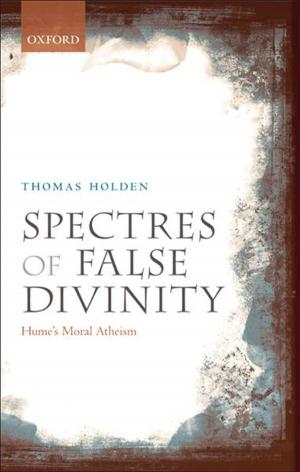Jesus as Philosopher
The Moral Sage in the Synoptic Gospels
Nonfiction, Religion & Spirituality, Christianity, Church, History| Author: | Runar M. Thorsteinsson | ISBN: | 9780192546852 |
| Publisher: | OUP Oxford | Publication: | May 24, 2018 |
| Imprint: | OUP Oxford | Language: | English |
| Author: | Runar M. Thorsteinsson |
| ISBN: | 9780192546852 |
| Publisher: | OUP Oxford |
| Publication: | May 24, 2018 |
| Imprint: | OUP Oxford |
| Language: | English |
Jesus as Philosopher: The Philosophical Sage in the Synoptic Gospels examines the possible ways in which the authors of the Synoptic Gospels, Mark, Matthew, and Luke, were inspired by contemporary philosophical traditions about the ideal philosophical sage in their description of their ideal human being, Jesus Christ. Runar M. Thorsteinsson considers the following questions: How does the author in question speak of Jesus in relation to contemporary philosophy? Do we see Jesus take on a certain 'philosophical' role in the Gospels, either by his statements and reasoning or his way of life? In what way are Jesus' words and actions analogous to that of leading philosophical figures in Graeco-Roman antiquity, according to these texts? Conversely, in what way do his words and actions differ from theirs? While Thorsteinsson discusses a number of Graeco-Roman sources, the emphasis is on the question of how these parallel texts help us better to understand the Gospel authors' perception and presentation of the character of Jesus. While the fields of theology and ethics are often intertwined in these texts, including the philosophical texts, Thorsteinsson's main focus is the ethical aspect. He argues that the Gospel authors drew in some ways on classical virtue ethics. The study concludes that the Gospel authors inherited stories and sayings of Jesus that they wanted to improve upon and recount as truthfully as possible, and they did so in part by making use of philosophical traditions about the ideal sage, especially that of Stoicism and Cynicism.
Jesus as Philosopher: The Philosophical Sage in the Synoptic Gospels examines the possible ways in which the authors of the Synoptic Gospels, Mark, Matthew, and Luke, were inspired by contemporary philosophical traditions about the ideal philosophical sage in their description of their ideal human being, Jesus Christ. Runar M. Thorsteinsson considers the following questions: How does the author in question speak of Jesus in relation to contemporary philosophy? Do we see Jesus take on a certain 'philosophical' role in the Gospels, either by his statements and reasoning or his way of life? In what way are Jesus' words and actions analogous to that of leading philosophical figures in Graeco-Roman antiquity, according to these texts? Conversely, in what way do his words and actions differ from theirs? While Thorsteinsson discusses a number of Graeco-Roman sources, the emphasis is on the question of how these parallel texts help us better to understand the Gospel authors' perception and presentation of the character of Jesus. While the fields of theology and ethics are often intertwined in these texts, including the philosophical texts, Thorsteinsson's main focus is the ethical aspect. He argues that the Gospel authors drew in some ways on classical virtue ethics. The study concludes that the Gospel authors inherited stories and sayings of Jesus that they wanted to improve upon and recount as truthfully as possible, and they did so in part by making use of philosophical traditions about the ideal sage, especially that of Stoicism and Cynicism.















